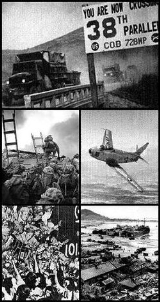
Korean War
The Korean War was a conventional war between South Korea, supported by the United Nations, and North Korea, supported by the People's Republic of China , with military material aid from the Soviet Union...
Timeline of Events
|
1950
|
|
||||||||||||
|
1951
|
|
||||||||||||
|
1952
|
|
||||||||||||
|
1953
|
|
||||||||||||
|
1958
|
|

